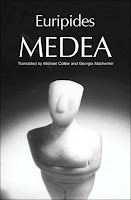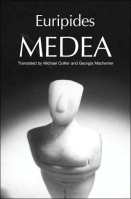But what is Medea's problem? Is it that she is an outsider in Corinth, to which she has fled with her husband Jason and their small children, unable to fit in or be accepted? Is it indeed that she is a non-Greek, a barbarian, who has to be expelled for the sake of social order and collective harmony? Is it that she is a woman, whom Jason feels he can drop in favour of a rather more advantageous match with the Corinthian King's daughter? Or is it that she is not enough of a woman, that she doesn't know that her role should be submissive and accepting in the face of Jason's pragmatic actions to maintain his fame and his legacy? Is she too emotional, too hysterical and so allows herself to be carried away by her anger and desire for vengeance, enough so as to commit the terrible act of murdering the King, the princess, and worst of all her two young offspring? Is she a monster? Is she crazy?
Or is her problem, by contrast, that she is too rational, too clever even for her own good? That far from turning away from or refusing the conventions of Greek democracy, she takes them to their limit, to the point at which the social contract is itself shown to be insane, unnatural, and monstrous?
In essence, Medea's complaint is that Jason has broken his contract with her. She insisted he make a promise to "love / and honor" her because, aware of the fickleness of familial and affective ties (having herself betrayed her father and killed her brother), she "thought only great oaths would keep / him bound" to her (163-66). Medea believes in such contracts, and believes that the Greeks do, too. Hence she also presses the Athenian King, Aegeus, to "restate [his] promise" that he will give her shelter in his city "as an oath. Only then will I feel secure. [. . .] An oath / Will keep your promises safe against / [her enemies'] powerful inducements to give me up" (725-26; 729-31). And indeed, despite what she has done, at the end Aegeus does provide her sanctuary in Athens. An oath is a solemn thing; the Corinthian Chorus agrees that, with Jason's (literal) disavowal of his bond to Medea "the spell of trust is broken" (444). The danger is that as a result everyone sees that trust is "merely" a spell, a form of words with no power over reality. If Jason's betrayal goes unpunished, then the putative basis of social order, the entire framework of civic incantations and declarations, may come to seem null and void.
Medea, in short, kills her children (and so ruins Jason and destroys his lineage) in order to uphold the social contract. Her claim is that our actions should not be guided either by passing whims or short-term pragmatism. The spell of trust must be maintained by insisting on the harshest of consequences for those who break it. And if Medea is an outsider, this only proves that those who most insist that society keeps its promises are those who have only the promise to depend on. Medea can't make any claims otherwise on affect, habit, or the connections that she could count on if she had grown up in the Greek polis, rubbing shoulders with neighbours and citizens.
But by insisting on the point, Medea inadvertently reveals that the contract is not fundamentally the basis of Greek sociability at all. The Corinthians are aghast: they admit that Medea is consistently in the right, that she has indeed made her case and invoked all the logic and reason that is on her side. Her clever use of argument bears out her threat that her "words / will pin [Jason] to the mat" (592-93). Yet the Chorus protests that her "justice [is] too harsh / for Jason's heartless crimes" (973-74). They plead for mercy, for the suspension of the law rather than Medea's single-minded determination to see the proper consequences follow Jason's precipitating actions.
To put this another way: the Chorus argues for the logic of exception, for the sovereign decision that comes not from following the law but from suspending it. They also thereby reveal the dirty little secret of Greek democracy (and perhaps democracy tout court): that in the end its promises are always at least potentially worthless; that the struggle for hegemony, for consensus, is but a distraction; and that those in power will always ignore the rules if it suits them. In the end, this is the problem of Medea.




